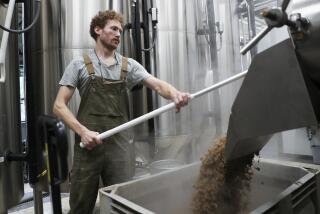The Harvard of Sudsy Science : School Turns Out Brew Masters for Beer Companies Around the World
- Share via
CHICAGO — Hoist a frothy stein to Siebel Institute of Technology--Brew Master U.--where the students strive for a better beer.
“I would call it the Harvard of the brew master schools,” recent graduate James Whilt Timper of Belleville, Ill., said
Since 1901--except during Prohibition, of course--the Siebel Institute has been turning out many of the world’s brew masters, those who make the beer that’s quaffed at the corner tap.
“The people at Siebel’s have my highest admiration. It’s unique in the country,” said Michael Lewis, a professor of brewing science at the UC Davis.
The graduation pictures that hang on the second floor carry some of the biggest names in suds: John W. Stroh Jr., class of ‘59; August A. Busch III, class of ‘61; August Pabst, class of ’67.
German Brewer’s Outpost
Siebel Institute is an arm of J. E. Siebel Sons’ Co., whose roots date to 1868, when the City of Chicago’s chief chemist, a husky German immigrant with a flowing beard, started a small laboratory to introduce European brewing techniques in the United States.
The North Side lab, a few feet from the screeching wheels of the elevated trains, was moved downtown after World War II, and to its current site among large homes and small industries on Chicago’s far Northwest Side in the 1950s.
In the basement, staff scientists have their own microbrewery, which produces 22 liters of beer a few times a month for research purposes.
The two-story, brick building modestly bears the name Siebel over the entrance, giving no hint to passers-by that the great-grandsons of J. E. Siebel Sr. are now at the helm of a company that trains brew masters and advises breweries big and small, from Guatemala to Canada to India.
Each fall, Siebel Institute accepts 25 to 30 students for an 11-week course in brewing technology. Most are employees of breweries around the world, sent to Chicago for classroom and laboratory training so they can be promoted to brew master or assistant brew master when they return.
Employers Pay Expenses
All expenses--tuition, food and lodging--are paid by the student’s employer.
The $5,650 course covers eight subjects: raw materials, brew house theory, fermentation, storage, packaging, quality control, laboratory and taste.
While there are many brewing academies in Europe, especially West Germany, the Siebel Institute has few peers in the United States. UC Davis offers undergraduate degrees in food science with an emphasis on brewing, but the Chicago school claims to be the only one that takes people already in the industry and trains them as brew masters.
The school accepts few students who do not have a brewing background, although, with a “fair amount of self-study and high degree of determination,” some others can get through the door, said the Executive Vice President William R. Siebel.
“What they’re taught here is the theory and the science behind malt beverages, from the various raw materials to their ultimate use in the brew house,” said Siebel, who said he couldn’t recall anyone failing the course. “We’re not teaching any specific formulas to make certain beers. At their breweries they use their own formulas. The art is learned on the job.”
Learning How to Taste
To the armchair drinker, a beer occasionally might taste bad, but at Siebel Institute, students are taught to determine if a beer tastes fruity, skunky, burnt or grainy.
It’s not all work. During lunch or after classes, students are usually found in the second-floor bierstube , quizzing each other on the day’s lessons or playing pool while having a snack and downing mugs of free beer, compliments of big-name breweries.
“When you get a student from Tasmanian (Australian brewery), “ Siebel said, “and a novice from California, they’re going to pick up all kinds of insights.
“They’re talking beer all the time.”
Cynthia L. Bauer has worked at a Stroh’s plant in Van Nuys, Calif., for four years and was recently promoted to assistant brew master.
Beer, she said, is a language everyone understands.
“You can talk about beer to anybody; I’m not talking about high-tech lasers,” she said. “On the other hand, it’s very scientific. There are 1,000 different ways to skin a cat and 1,000 different ways to make beer. That’s why we’re here.”
Women Entering Field
Bauer, 28, was one of two women graduates in the most recent class. Does she see herself as a pioneer in an industry dominated by men?
“What’s your image of a brew master?” she replied. “An old guy with a bit of a belly? Well, these guys are retiring, moving on. Granted, there are not too many women, but we’ll make it.”
Unlike most of his classmates, Timper, 31, is unemployed and simply wants to get back into the beer business. He was a production worker at Stag Brewery in Southern Illinois, but it closed a few months ago and Timper lost his job.
He had to borrow money for the Siebel tuition.
“I had a choice: stand in a long, unruly unemployment line or be a student,” Timper said. “Siebel is considered a very good steppingstone to further a career or start one. It has the market cornered. This whole thing is a gamble I needed to take.”
More to Read
Eat your way across L.A.
Get our weekly Tasting Notes newsletter for reviews, news and more.
You may occasionally receive promotional content from the Los Angeles Times.










